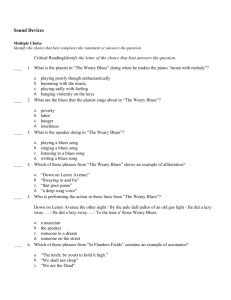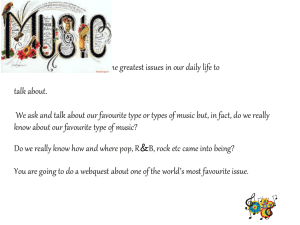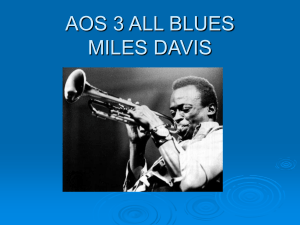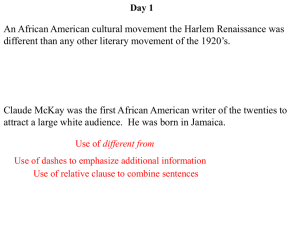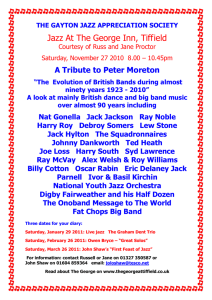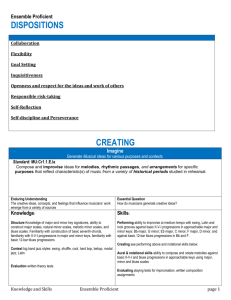King Student Name Teacher English 9 23 February 2013 B.B.`s
advertisement
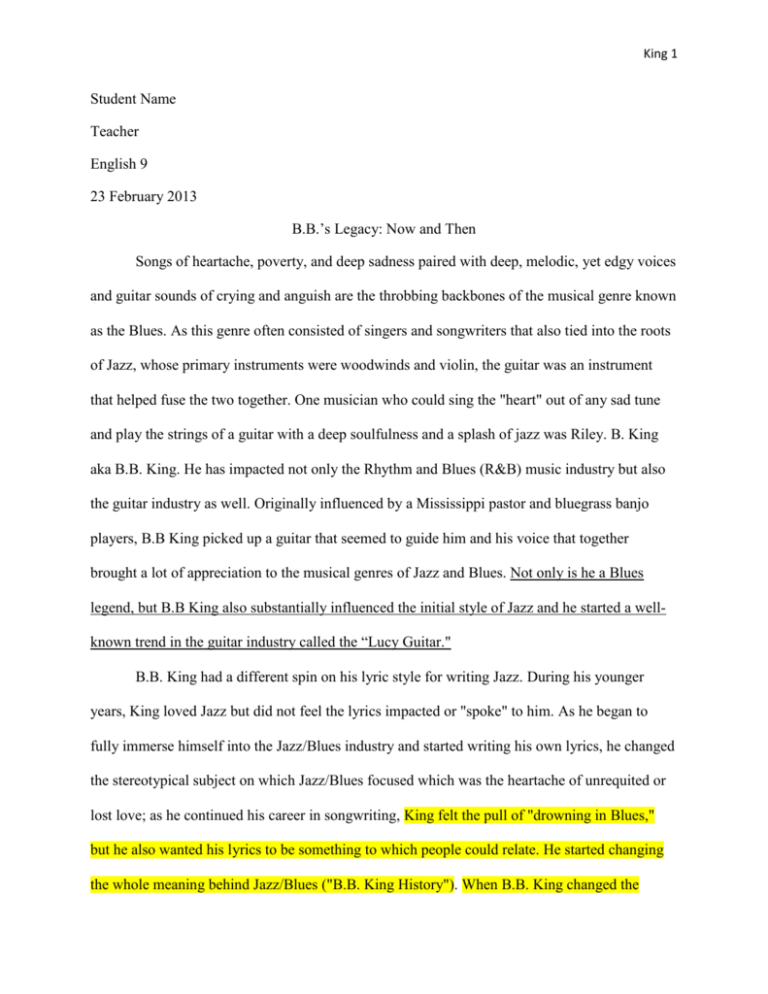
King 1 Student Name Teacher English 9 23 February 2013 B.B.’s Legacy: Now and Then Songs of heartache, poverty, and deep sadness paired with deep, melodic, yet edgy voices and guitar sounds of crying and anguish are the throbbing backbones of the musical genre known as the Blues. As this genre often consisted of singers and songwriters that also tied into the roots of Jazz, whose primary instruments were woodwinds and violin, the guitar was an instrument that helped fuse the two together. One musician who could sing the "heart" out of any sad tune and play the strings of a guitar with a deep soulfulness and a splash of jazz was Riley. B. King aka B.B. King. He has impacted not only the Rhythm and Blues (R&B) music industry but also the guitar industry as well. Originally influenced by a Mississippi pastor and bluegrass banjo players, B.B King picked up a guitar that seemed to guide him and his voice that together brought a lot of appreciation to the musical genres of Jazz and Blues. Not only is he a Blues legend, but B.B King also substantially influenced the initial style of Jazz and he started a wellknown trend in the guitar industry called the “Lucy Guitar." B.B. King had a different spin on his lyric style for writing Jazz. During his younger years, King loved Jazz but did not feel the lyrics impacted or "spoke" to him. As he began to fully immerse himself into the Jazz/Blues industry and started writing his own lyrics, he changed the stereotypical subject on which Jazz/Blues focused which was the heartache of unrequited or lost love; as he continued his career in songwriting, King felt the pull of "drowning in Blues," but he also wanted his lyrics to be something to which people could relate. He started changing the whole meaning behind Jazz/Blues ("B.B. King History"). When B.B. King changed the King 2 meaning behind the lyrics of Jazz/Blues, he also brought more meaning and soul to the lyrics. So he started writing about his personal experiences ("B.B. King"). These songs were not just about love; each song had a special meaning to him and his own childhood and life experiences. His lyrics were relatable to his fans. As he furthered his career and created new songs based on personal experience, the more his record sales increased ("B.B History"). NEEDS EXPLANATIONS HERE BEFORE GOING TO THE NEXT POINT ABOUT OTHER ARTISTS Other artists started taking notice of this new Blues/Jazz style and shift in B.B. King’s lyrics. They started to copy his writing style and write about lessons learned about life instead of just life itself. (Stonitsch Tip: If you mention other artists being influenced by your inductee, then you need to state who they are and cite this information.) As this trend continued, Jazz/Blues became more popular and so did B.B. King as a performer who began paving his way to legendary status. Due to King thinking outside of the box with his choice of lyrics, he changed the meaning behind Jazz/Blues lyrics. (Stonitsch Tip: the meaning behind Jazz/Blues lyrics is vague--always perceive your reader as a novice or a beginner that may not know specific terms or word choice that connect to your topic or idea) B.B. King's success with his songs was not just because of the words he carefully selected but also because of the actual music that accompanied these soul-wrenching lyrics. His song writing style was really personal to him. B.B. manifested some of the most well-known guitar styles, with varying techniques including the Box technique and G Progression. Country and Gospel music also had a big impact on B.B.’s musical influence. He liked the feel of it, so he wanted to apply that same feeling Country and Gospel music gave him into his songs (“Music” 1). (Stonitsch Tip: Provide a song example or another specific detail with a citation to further develop the point of him tying his music to County and Gospel sounds) King had a different King 3 thought process than most. As some writers choose to create the main points or the body paragraphs before beginning the introduction of an essay, B.B. King also would start with making the chorus of a song before the melody. It was and still is a unique way to write songs. (Stonitsch Tip: This needs further support and citation or it sounds like a personal opinion) The process gave him a better understanding of his songs. Just like other artists copying his lyric process, artists started to copy his song writing process as well. (Provide examples and document) He made yet another major impact in the music industry. These two unique aspects of B.B. King's Jazz/Blues musical style continued to be recognized and admired by fans as well as the music industry. Jazz and Blues, with King's musical prowess, began to change for the better leading to a bigger audience. Sales started to drastically increase, and more and more people began to appreciate the musical styling of Jazz/Blues. King not only established an unwavering amount of admiration and awe from his fans, but he also began appearing on Radio Stations and talk shows. B.B. King's own personal fame also opened the public eye to power of Jazz and Blues as musical genres. (Stonitsch Tip: Needs documented support to further develop your topic) Finally, B.B King made one more huge impact in the music world: his guitar who he lovingly called Lucille which was then nicknamed Lucy. He carried Lucy everywhere. One day, B.B was playing a concert in a bar when a fight broke out, and during the fight, a kerosene lamp broke and it set the bar ablaze. As B.B ran out, he forgot he left Lucy so he ran back into the flames. He risked his life for something lifeless: a piece of wood and metal. King loved the look of Lucy and played "her" at every one of his concerts, refusing to perform without "her." Many “Lucilles” have passed through his hands, but he always chose the same style which is now King 4 known as a Gibson Flying V. The Lucy guitar became an icon in the guitar industry. (Stonitsch Tip: No cited support is present--be wary of plagiarism) Over the years, King came up with his own guitar techniques. He started recording them. People loved the sound. People started purchasing Lucy guitars and similar styles are still sold today. B.B King is just as influential for musicians and Blues and Jazz fans today as he was 30 years ago. At age 76, he is still doing what he loves: playing his current "Lucy" and singing the Blues. As King once stated, “I never use the word retire.” (No citation to this direct quote is plagiarism) B.B continues to tour, averaging 250 concerts a year. He plans to die doing what he loves: making music. B.B. King's own musical career inspires people to remember how vital it is to do what they love to make one's own life legendary.
